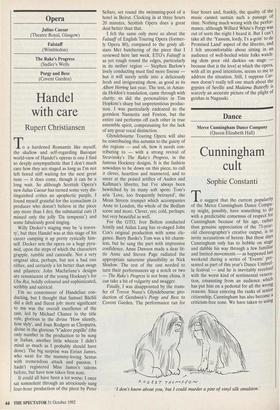Op e ra Julius Caesar (Theatre Royal, Glasgow) Falstaff (Wimbledon)
The Rake's Progress (Sadler's Wells Porgy and Bess (Covent Garden)
Handel with care
Rupert Christiansen
To a hardened Romantic like myself, the shallow and self-regarding Baroque world-view of Handel's operas is one I find so deeply unsympathetic that I don't much care how they are staged as long as I'm not left bored stiff waiting for the next great tune — it does come, though it can be a long wait. So although Scottish Opera's new Julius Caesar has turned some very dis- tinguished critics an apoplectic purple, I found myself grateful for the iconoclasm (a producer who doesn't believe in the piece any more than I do), the substantial cuts (I missed only the jolly 'Da tempeste') and some fabulously good singing.
Willy Decker's staging may be 'a traves- ty', but then Handel was at this stage of his career camping it up pretty cynically him- self. Decker sets the opera on a huge pyra- mid, upon the steps of which the characters grapple, tumble and canoodle. Not a very original idea, perhaps, but not a bad one either, and certainly a lot better than swags and pilasters: John Macfarlane's designs are reminiscent of the young Hockney's for Ubu Roi, boldly coloured and sophisticated, scribbly and satirical.
I'm no connoisseur of Handelian con- ducting, but I thought that Samuel Bachli did a deft and fluent job: more significant to me was the overall excellence of the cast, led by Michael Chance in the title role, glorious in the divine 'How silently, how slyly', and Joan Rodgers as Cleopatra, divine in the glorious `V'adoro pupille' (the only number in the production to be sung in Italian, another little wheeze I didn't mind as much as I probably should have done). The big surprise was Eirian James, who went for the mummy-loving Sextus with tremendous attack and passion. I hadn't registered Miss James's talents before, but have now taken firm note.
It could all have been a lot worse: I once sat somnolent through an atrociously sung four-hour production of the piece by Peter Sellars, set round the swimming-pool of a hotel in Beirut. Clocking in at three hours 20 minutes, Scottish Opera does a great deal better than that.
I felt the same only more so about the Falstaff of English Touring Opera (former- ly Opera 80), compared to the grisly all- stars Met butchering of the piece that I reviewed here last week. ETO's Falstaff is as yet rough round the edges, particularly in its nether region — Stephen Barlow's lively conducting must find more finesse but it will surely settle into a deliciously fresh and invigorating show, as good as its Albert Herring last year. The text, in Aman- da Holden's translation, came through with clarity; so did the personalities in Tim Hopkins's sharp but unpretentious produc- tion. I was particularly endeared to the gormless Nannetta and Fenton, but the entire cast performs off each other in true ensemble spirit, compensating for the lack of any great vocal distinction.
Glyndebourne Touring Opera will also be contributing this autumn to the gaiety of the regions — and oh, how it needs con- tributing to — with a strong revival of Stravinsky's The Rake's Progress, in the famous Hockney designs. It is the fashion nowadays to be down on this piece, to call it clever, heartless and mannered, and to sneer at the poised artifice of Auden and Kaftan's libretto, but I've always been bewitched by its many soft spots: Tom's aria 'Love, too frequently betrayed', the Mean Streets trumpet which accompanies Anne to London, the whole of the Bedlam scene and more. Clever, yes; cold, perhaps; but very beautiful as well.
For the GTO, Ivor Bolton conducted feistily and Aidan Lang has re-staged John Cox's original production with some ele- gance. Barry Banks's Tom was a bit charm- less, but he sang the part with impressive confidence. Anne Dawson made a dear lit- tle Anne and Steven Page radiated the appropriate saturnine plausibility as Nick Shadow. The rest of the cast needed to turn their performances up a notch or two — The Rake's Progress is not bone china, it can take a bit of vulgarity and swagger.
Finally, I was disappointed by the trans- fer of Trevor Nunn's Glyndebourne pro- duction of Gershwin's Porgy and Bess to Covent Garden. The performance ran for four hours and, frankly, the quality of the music cannot sustain such a passage of time. Nothing much wrong with the perfor- mance, although Willard White's Porgy was out of sorts the night I heard it. But I can take all the `Yassum, lordy, I's a-goin' to de Promised Land' aspect of the libretto, and I felt uncomfortable about sitting in an audience of well-heeled white folks watch- ing dem poor old darkies on stage because that is the level at which the opera, with all its good intentions, seems to me to address the situation. Still, I suppose Car- men doesn't really tell one much about the gypsies of Seville and Madama Butterfly is scarcely an accurate picture of the plight of geishas in Nagasaki.


























































 Previous page
Previous page